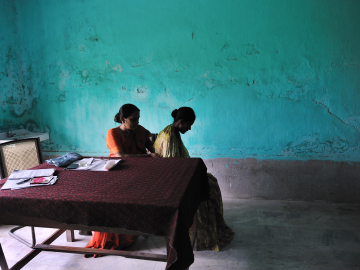Hang on, New Public Health Grads: Strong Long-Term Outlook for Jobs
With the biggest pandemic in a century raging, you’d think this year’s 15,000 new public health graduates wouldn’t have much difficulty finding a job. But COVID-19 has badly shaken the economy and depleted government coffers, making near-term hiring prospects rocky at best.
Longer-term, however, the outlook is much brighter as the expected rate of growth for public health jobs will more than double the average rate for all occupations across the US.
In the short run, Heather Krasna, MS, anticipates that we’ll see surge capacity hiring for clinical testing and lab positions, health educators, and contact tracers. (The Bloomberg School is offering a free online course for contact tracers; you can learn more here.) However, many of the new jobs are temporary, or fairly entry level, notes Krasna, the assistant dean and director of Career Services at Columbia University’s Mailman School of Public Health.
Even though a bulked-up public health workforce is needed, battered state and municipal budgets mean new grads should be prepared for hiring freezes in health departments, says Ashley Edmiston, MPH, director of Workforce Development for the National Association of County and City Health Organizations. Emergency budgets are maxed out, federal funding is delayed, and uncertainty over long-term needs abounds.
“In better times, MPH grads could just update their LinkedIn profile and wait for recruiters to find them. That’s probably not going to happen for most graduates now,” Krasna notes.
Still, she says, “If you had to choose what to study, in the most tragic way, it is the best time to study public health.”
Charles Ng, MBBS, MPH, a brand-new Johns Hopkins Bloomberg School of Public Health graduate, feels fortunate that he secured a job before the pandemic disrupted hiring plans. He knows some recent graduates who have had job offers rescinded or are still waiting to hear back from prospective employers. And others must decide where to work and live without the benefit of in-person interviews.
"The consequences of this pandemic are quite deep; I fear that we’re going to feel them for a long time,” says José Ramón Fernández-Peña, MD, MPA, president-elect of the American Public Health Association. “I think people are going to find themselves in economic duress; asking if they’ll be able to cover the costs of their education … endowments of schools will be reduced, and federal assistance may or may not be there.”
The biggest unknown is the direction of federal investment in the workforce because it affects placements, job availability, and wages. “The consistent under-resourcing of the public health system is glaringly obvious,” says Angela Beck, PhD, MPH, a clinical assistant professor in the University of Michigan’s Department of Health Behavior and Health Education. “I think public health needed an infusion of funds before this; now we need it that much more.”
In fact, an estimated 19% of public health positions in state, territorial, and local public health departments—about 51,000 jobs in total—were erased by the 2008 recession and never came back, for the most part.
But before the pandemic hit, the Bureau of Labor Statistics projected a rise in key public health career tracks—such as epidemiology and health educators, and statisticians—of 5%, 11%, and 30%, respectively, between 2018 and 2028.
“While it’s hard to measure the near future, the longer-term projections for public health jobs look promising and are expected to hold up,” says Kristen Campbell, content director at Hanover Research. She points to more encouraging estimates from the Bureau of Labor Statistics and state labor departments, indicating that public health-related occupations will grow by 17% in the Mid-Atlantic/Eastern region of the US and almost 14% nationally—much faster than the average rate of growth for all occupations in that region (9%) and across the country (5.2%).
Recent job postings reveal more cause for optimism, Campbell adds, citing data from economic consulting firm Chmura Economics & Analytics—which tallied 3,300+ public health job postings in the last 6 months for the Mid-Atlantic/Eastern part of the US.
“It is hard to find any kind of silver lining in a pandemic that is killing hundreds of thousands of people,” Fernández-Peña says—but it has created unprecedented awareness of the importance of public health. “When the public understands better the critical role that we need to play, society may demand more support,” he says.
COVID-19 has also revealed which public health skills are most in demand—such as the ability to address glaring disparities in the US health system. Public health workers talented in coalition-building and community engagement are especially needed, says Edmiston.
Communication and interviewing skills—including an ability to read people and connect to them with empathy and put them at ease—are also crucial now, particularly in roles like contact tracing, says Joann Schulte, DO, deputy health authority and medical director of the Dallas County Department of Public Health.
Other skills in demand are infection control planning and advising businesses that are reopening, Schulte says. Companies and organizations need guidance on everything from crowd control, to airflow considerations and redesigning crowded communal areas like dining areas and bathrooms in dormitories, group homes, prisons, and shelters.
The uncertainties can by unsettling, says Deanna Wathington, MD, MPH, the executive dean of the Petrock College of Health Sciences at Bethune-Cookman University. But she reminds public health graduates that, “this is what we’re built for … and what we do is vital and necessary.”
Expert Advice for New Grads:
- “You may not get your dream job right now … but until it comes, put a public health frame on the jobs that are available,” says Beck.
- “Your job search has to look different now. Reset expectations, be flexible; you’re sure to find something related to your training, and the skills you pick up will benefit you later when your ideal job opens up,” advises Krasna, who has 20+ years of experience as a career coach.
- “It is a time to be creative and find the many spaces we can pursue as public health professionals … in academia, research, as traditional health educators, and very much in the field of policy and advocacy. As public health professionals we must claim a space at those tables,” says Fernández-Peña.
- “Reach out to your local public health department … jobs may come up quickly. Many health departments can also use volunteers—a great way to build relationships with staff and the community,” counsels Edmiston.
- “If you haven’t already joined [the public health workforce], join us. If you’re in, stay in, excel, and add another field you like to your arsenal,” says Wathington.
For the latest, most reliable COVID-19 insights from some of the world’s most respected global health experts, see Global Health NOW’s COVID-19 Expert Reality Check.
Join the tens of thousands of subscribers who rely on Global Health NOW summaries and exclusive articles for the latest public health news. Sign up for our free weekday newsletter, and please share the link with friends and colleagues: https://www.globalhealthnow.org/subscribe
Christopher Furlong/Getty





